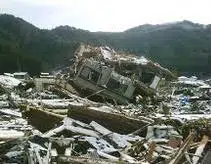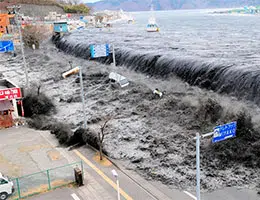 The term disaster , which derives from the Occitan language , refers to a tragic, regrettable or unfortunate event . A disaster is a misfortune of great magnitude that greatly affects the victims or those harmed.
The term disaster , which derives from the Occitan language , refers to a tragic, regrettable or unfortunate event . A disaster is a misfortune of great magnitude that greatly affects the victims or those harmed.
For example: “Disaster in Southeast Asia: a tsunami left more than a thousand dead” , “The earthquake caused a disaster throughout the province” , “The government made a disaster in the national economy” .
Generally the idea of disaster refers to an event that causes great damage to people or the environment , generating a forced change of negative characteristics. This type of event can have a natural cause or be caused by humans.
In January 2010 , to cite one case, a natural disaster occurred that affected Haiti . At that time, an earthquake of enormous magnitude was recorded in the Caribbean country, which later had several aftershocks. It is estimated that the earthquake caused the death of some 316,000 people , in addition to destroying much of the nation 's infrastructure.
World War II , on the other hand, was a man -made disaster. Between 1939 and 1945 , this war involving numerous armies caused more than 50 million deaths .
The notion of disaster is also used to define that which has poor quality ( "This hotel is a disaster: the bed is broken, the breakfast is horrible and the employees are rude" ) and those whose actions go wrong ( "In the last match, the Spanish defender was a disaster” ).
Measures to reduce the consequences of a natural disaster
 Those who have survived a natural disaster know that it is a true nightmare that can take the lives of hundreds of people, destroy their homes and leave an indelible mark in its wake. But we are not completely defenseless in the face of a phenomenon of this type, especially if governments commit to implementing certain measures to reduce its impact on the population.
Those who have survived a natural disaster know that it is a true nightmare that can take the lives of hundreds of people, destroy their homes and leave an indelible mark in its wake. But we are not completely defenseless in the face of a phenomenon of this type, especially if governments commit to implementing certain measures to reduce its impact on the population.
First of all, it is recommended that citizens have at their disposal certain material means to protect themselves and deal with a natural disaster . This becomes especially necessary for people with reduced mobility, for the elderly and for children. The proof that this measure can make a difference is that the most developed countries, where they have already been applied on more than one occasion, always recover more easily than the others.
Another piece of advice offered by experts in this matter is the creation of territorial planning plans , both for cities and municipalities, that take into account potential natural hazards. Through these, institutional officials should prohibit people from occupying high- risk areas, as well as provide effective reporting systems to inform the authorities if someone fails to comply with this rule.
To indicate the degree of exposure of each territory, there are risk maps , where it is possible to capture the areas in which landslides, floods, storms, droughts, volcanism and seismicity, among other natural disasters, could occur. The preparation of these maps is mandatory in many countries, as well as their free publication so that citizens have the possibility of consulting them whenever they wish.
Education is always the key to the growth of society, and in the specific case of natural disasters it can provide the population with the necessary tools to proceed without losing their cool. Both professionals and volunteers must go through a training process that prepares them to deal with emergencies effectively, with a clear vision of the priorities and knowledge to assist victims.
